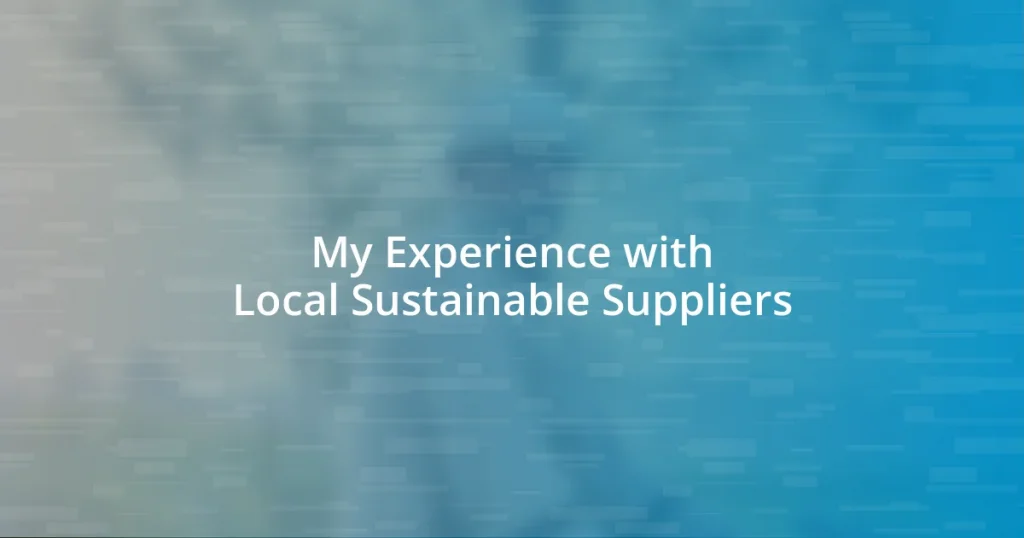Key takeaways:
- Connecting with local sustainable suppliers enhances appreciation for products and their stories, transforming purchasing into meaningful relationships.
- Supporting local suppliers contributes to community well-being, fosters personal connections, and promotes environmental sustainability.
- Engaging with suppliers through transparency and shared values deepens trust and enriches the shopping experience, leading to memorable moments and workshops.
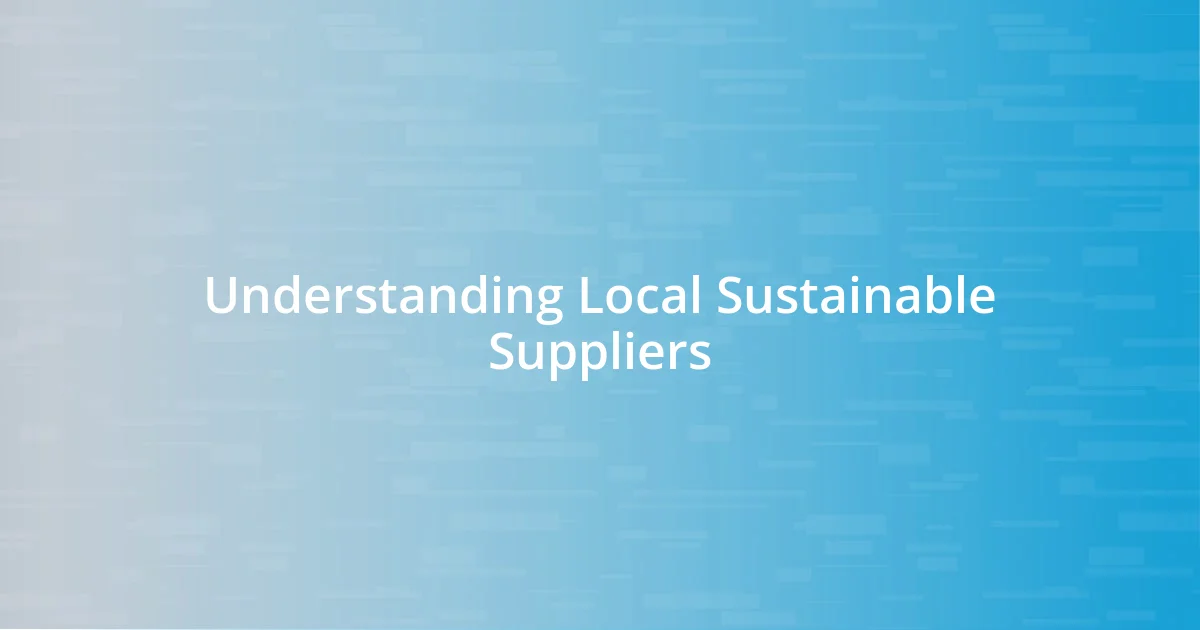
Understanding Local Sustainable Suppliers
When I first began exploring local sustainable suppliers, I was struck by the genuine passion these individuals have for their craft. It’s not just about selling products; it’s about building relationships within the community. Have you ever considered how much more meaningful it is to know the story behind your food or items?
On one occasion, I visited a local farm that practices regenerative agriculture, and I was fascinated to learn how their methods enrich the soil and support biodiversity. It wasn’t just a shopping trip for me; it felt like stepping into a vibrant ecosystem. The pride in the farmer’s voice as they shared their practices left an indelible mark on my perspective about sustainability.
Understanding these suppliers means appreciating their challenges too. They often face hurdles, such as competing with mass-produced goods that lack ethical sourcing. This realization made me reflect on my own purchasing choices. How often do we think about the impact of our decisions on the local economy and the environment? It’s a journey worth taking, and it deepens my commitment to supporting them.
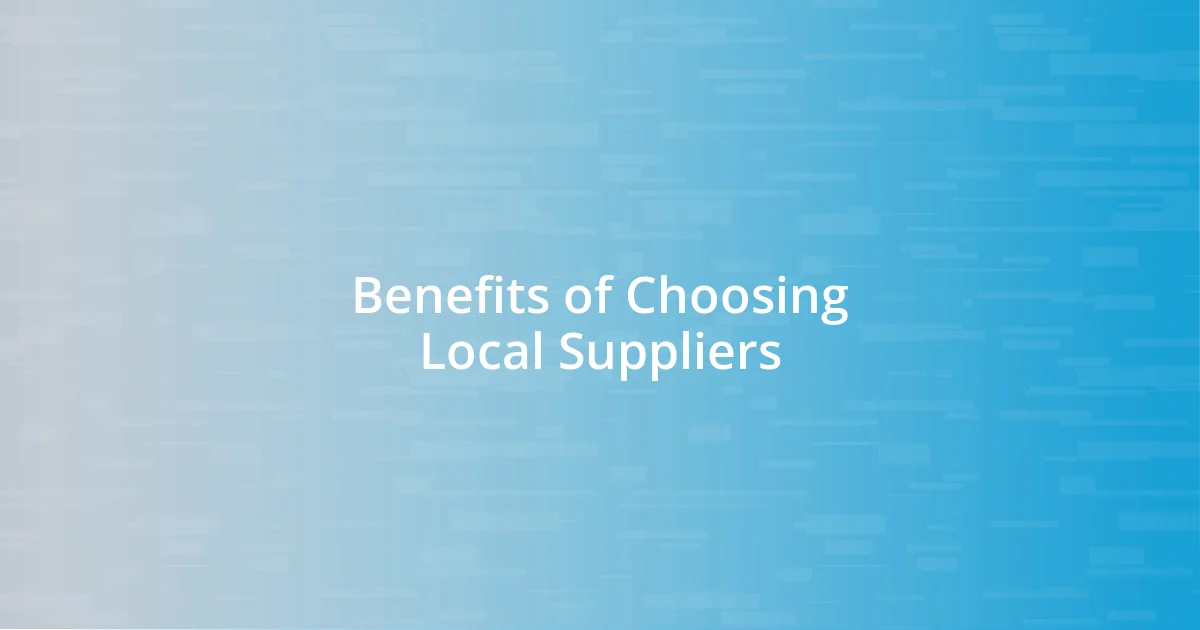
Benefits of Choosing Local Suppliers
Choosing local suppliers has profound benefits that can directly impact both the community and myself. For instance, when I opted for a local bakery over a chain, I was amazed by the vibrancy and unique flavors of their artisan bread. Each loaf carried a story and reflected the season’s best ingredients, showcasing creativity and care that mass-produced bread simply can’t match. Isn’t it energizing to think about where your food comes from and how it’s made?
On another occasion, I collaborated with a local craftsman for some home décor. His commitment to sustainable practices meant that every piece was not only beautiful but also made from reclaimed materials. I often think about how refreshing it is to support artisans who truly respect the environment—this creates a tangible sense of community and belonging. It’s like learning that each product has a personality, woven with the love and intention of the maker.
Additionally, supporting local suppliers has a ripple effect. When I buy from a nearby farmer’s market, I know my money stays within the community, helping to sustain jobs and local economies. There’s something incredibly satisfying about knowing that my choices contribute to the well-being of those around me. Have you ever felt that connection while shopping? It shifts the entire experience from transactional to a relationship filled with heart.
| Benefit | Impact |
|---|---|
| Fosters Community Connection | Encourages relationships among locals |
| Supports Local Economy | Enhances job opportunities and retains wealth |
| Quality and Uniqueness | Offers products crafted with care and creativity |
| Environmental Impact | Reduces carbon footprint through local sourcing |
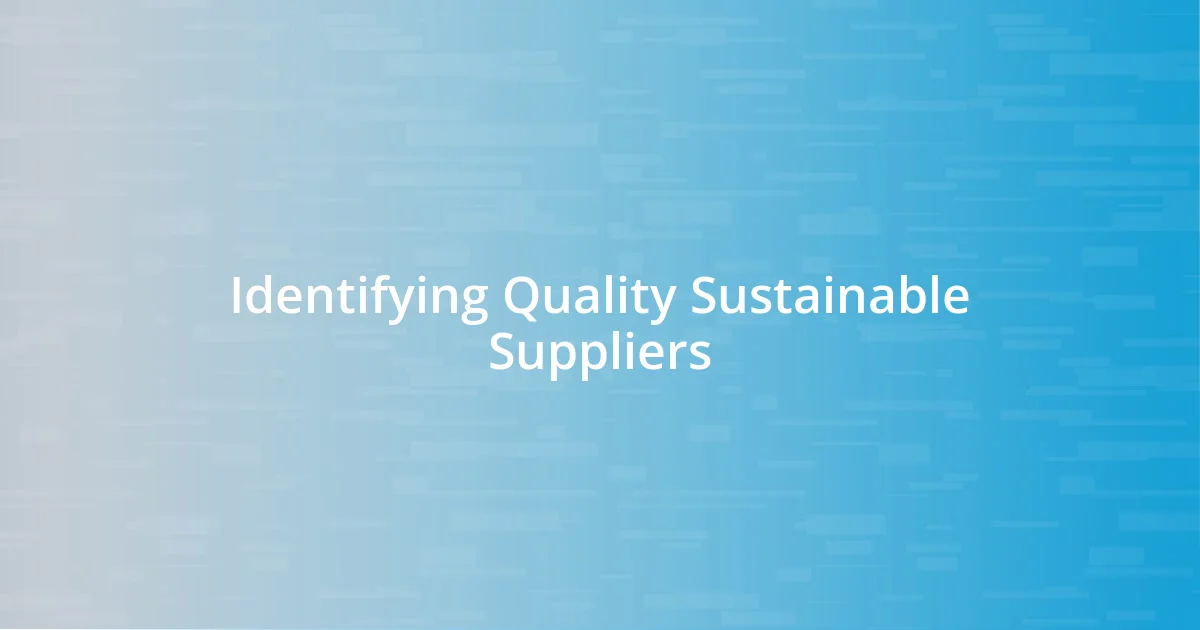
Identifying Quality Sustainable Suppliers
Identifying quality sustainable suppliers begins with doing a bit of homework, but the rewards are worth it. I remember a time when I stumbled upon a local herb garden while researching organic options. The owner was open to sharing their growing practices and even offered suggestions for using the herbs in my cooking. I felt a genuine connection—as if I had discovered a hidden gem in my community, which elevated my appreciation for the ingredients I was using.
To find suppliers that prioritize sustainability, consider these factors:
- Certifications: Look for organic, Fair Trade, or other eco-labels that indicate adherence to sustainable practices.
- Transparency: Suppliers who are willing to share their sourcing and production methods exhibit integrity. This openness builds trust.
- Local Engagement: A supplier’s involvement in community initiatives demonstrates a commitment to social responsibility.
- Quality of Products: Taste and craftsmanship are often indicators of care in production—try samples whenever possible.
- Reputation: Seek out reviews or ask for recommendations from other local customers who prioritize sustainability.
Each interaction can lead to enlightening experiences and forge deeper ties with the people behind the products we love. The thrill of finding someone who shares your values is genuinely special.
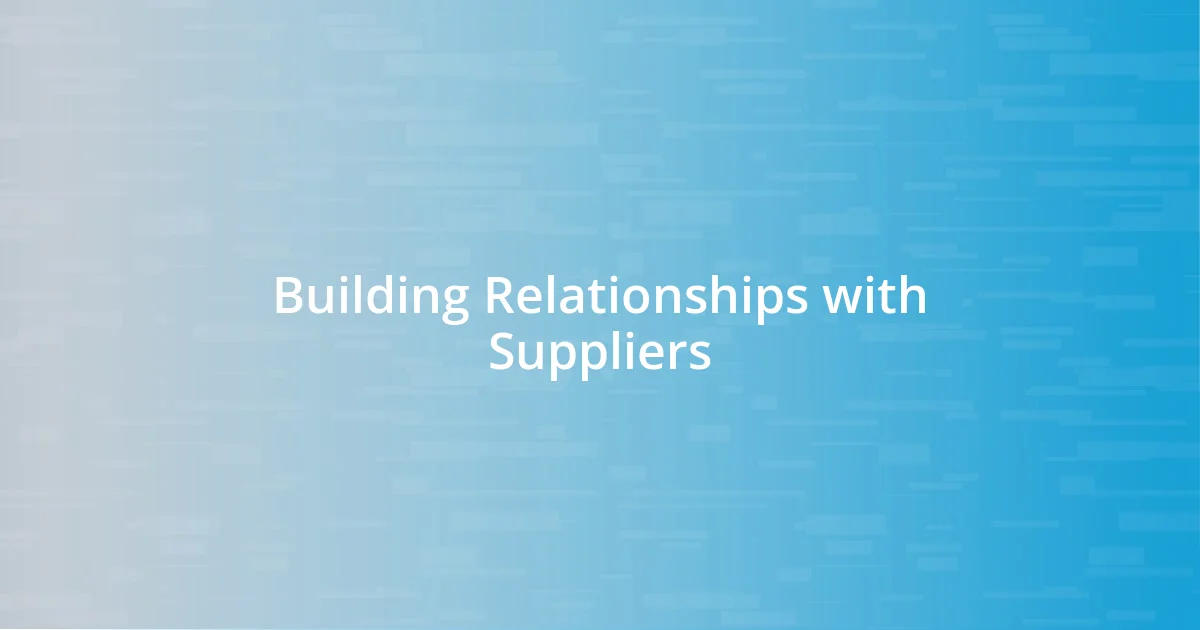
Building Relationships with Suppliers
Building strong relationships with suppliers has been a rewarding journey for me. I recall my first meeting with a local coffee roaster. Over a cup of their freshly brewed coffee, we chatted about the sourcing of their beans and ethical practices. It felt less like a transaction and more like a friendship forming over shared values. Isn’t it enriching to connect over something as simple as coffee?
As I continued to engage with my suppliers, I noticed the power of open communication. I remember reaching out to a local organic farmer to discuss my dietary preferences. Not only did they take the time to understand my needs, but they also shared tips on seasonal produce and cooking methods. That personal touch transformed my shopping experience into a collaboration; it became evident that our relationship was built on trust and mutual respect.
I’ve also found that fostering these connections can lead to unexpected opportunities. A small artisan baker I support once invited me to a workshop on bread-making. This not only deepened my appreciation for their craft but allowed me to share the experience with friends, spreading the word about their bakery. Isn’t it fascinating how these relationships can transform not just our purchases, but also the way we experience our local community?

How to Evaluate Supplier Practices
Evaluating supplier practices is more than just checking a few boxes—it’s about digging deeper into their operations. I once met with a local winery that opened its doors for a tour. Seeing their sustainable vineyard practices firsthand made me realize how transparency can truly enhance trust. Have you ever walked into a place that just radiated authenticity? It leaves a lasting impression.
One effective approach is to ask targeted questions about their supply chain. For example, I inquired about the origins of the seeds used by a local vegetable supplier. The detailed answers I received highlighted their commitment to organic farming and showcased a dedication to reducing environmental impact. It’s those kinds of conversations that elevate a simple transaction into a meaningful connection that resonates with my values.
Another crucial aspect is observing how suppliers treat their employees and the local community. I recall visiting a small bakery that proudly displayed pictures of their staff events. This not only showcased their team spirit but also showed their commitment to fair labor practices. How can we support businesses that don’t support their own people? For me, it’s a no-brainer; I want to invest in suppliers who align with my ethics.
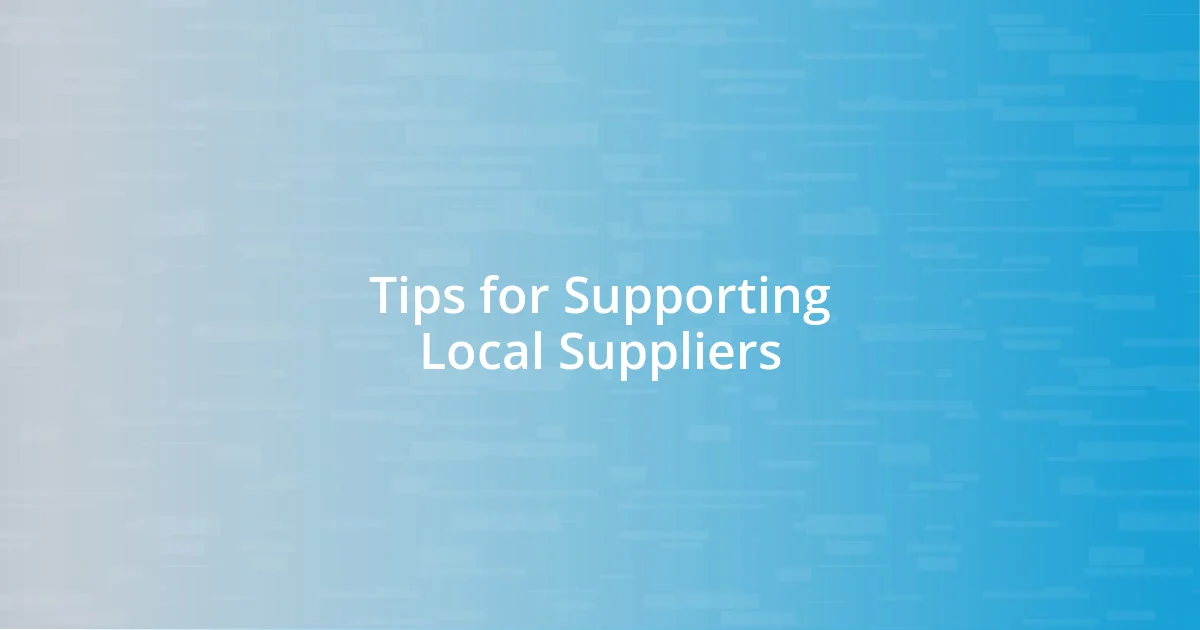
Tips for Supporting Local Suppliers
Supporting local suppliers is a rewarding experience, and it starts by being mindful about how we spend our money. I make it a point to explore farmer’s markets and local shops, enjoying the vibrant atmosphere while chatting with vendors. Each time I find a new product, I feel a sense of excitement, as if I’m unearthing hidden gems that tell the story of my community. Have you ever felt that thrill when discovering something truly unique?
Engaging with your local suppliers goes beyond just purchasing; it’s about building a community around shared values. I remember attending a community event where local producers showcased their products. It was refreshing to hear their stories—like the cheesemaker who spoke passionately about his craft and the animals he raised. It made me realize how supporting them fosters a sense of belonging within our locality. How great is it to know that your purchase contributes directly to someone’s dream?
Lastly, don’t shy away from spreading the word about the suppliers you love. I often share my favorite finds on social media or through word-of-mouth. This not only helps local suppliers gain visibility but creates a ripple effect, encouraging others to support them too. Have you thought about how your influence can uplift those businesses that work so hard? In my experience, it feels good to champion those who pour their heart into what they do.
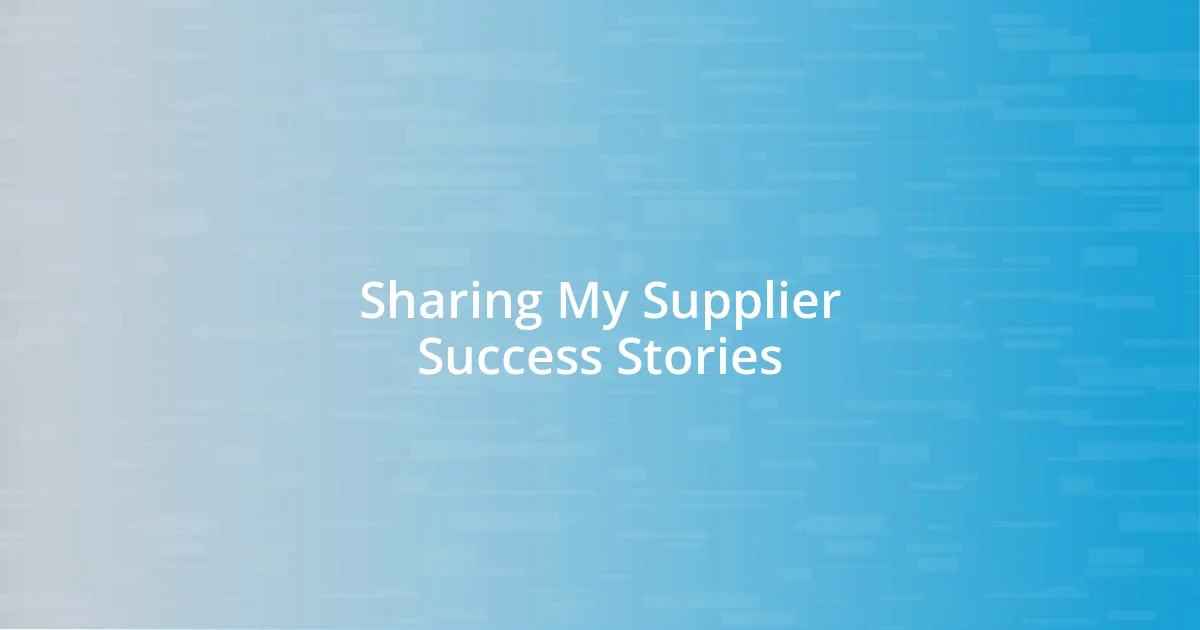
Sharing My Supplier Success Stories
It’s always rewarding to see the tangible results of working with local suppliers. When I partnered with a small family-owned farm for seasonal vegetables, the transformation in my meals was remarkable. Imagine biting into a ripe tomato that was picked just hours before! It brings a freshness that store-bought produce simply can’t match. Have you ever tasted something so good it made you question your previous choices?
One memorable moment was when the farm invited me to their harvest festival. I remember standing in the field, surrounded by excited families, as we picked our own strawberries straight from the plants. That experience not only deepened my appreciation for the work that goes into farming but also highlighted the genuine connections formed within the community. It just hits differently when you can see and feel the energy of local suppliers. Doesn’t it stir something in you to be a part of that?
Another success came from collaborating with a local artisan who crafts handmade soaps. After trying out their products, I scheduled a small workshop where I could learn the soap-making process firsthand. It was a joy to get my hands messy, create something beautiful, and hear the passion behind their craft. It reinforced my belief that local suppliers offer more than products; they provide experiences that elevate our everyday lives. How often do we find ourselves craving that kind of connection?











